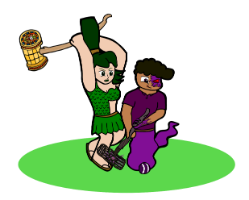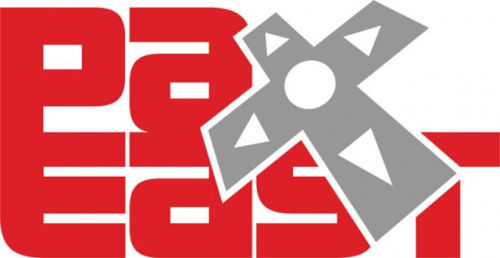What follows are my Top Ten favorite things about PAX East 2014, in no particular order.
Unpub
 Unpub, the unpublished games network, is a fantastic resource for assisting new game designers looking for feedback, playtesting and showcasing their wares to people. This was the first year that Unpub was at PAX, and it was a tremendous benefit to having them there. Manned by Darrel Louder and Chris Kirkman (of Dice Hate Me Games) and Mike Mullins, it afforded an outlet where unfinished demos and prototypes could go to feel safe amongst the throngs of established games being shown off via vendors and the gaming library.
Unpub, the unpublished games network, is a fantastic resource for assisting new game designers looking for feedback, playtesting and showcasing their wares to people. This was the first year that Unpub was at PAX, and it was a tremendous benefit to having them there. Manned by Darrel Louder and Chris Kirkman (of Dice Hate Me Games) and Mike Mullins, it afforded an outlet where unfinished demos and prototypes could go to feel safe amongst the throngs of established games being shown off via vendors and the gaming library.
I got to try out a number of games there, including Resistor, Killer Croquet and Yardmaster.
Resistor is a two-player game where each side is a supercomputer trying to corrupt one another’s CPU. This is done by having a series of cards between the two CPUs, and each turn you alter the pathways between them. If you can get a completed path to the other side, the other side takes damage. If you do it enough times, you win.
 Killer Croquet is an aptly named little game about, well, the game of croquet. Players square off against one another by rolling dice and getting their balls through the necessary wickets to become a poison ball. Then, when you hit other player’s balls, they are temporarily removed from the game.
Killer Croquet is an aptly named little game about, well, the game of croquet. Players square off against one another by rolling dice and getting their balls through the necessary wickets to become a poison ball. Then, when you hit other player’s balls, they are temporarily removed from the game.
The difference, of course, is that in addition to getting points for becoming poison, reaching the end poles, and knocking out other player’s balls, you also can take whacks at the players themselves. Whether hits against balls or players succeed is determined by a small deck of cards. So, you have trying to accomplish your goal, knocking out other people, and occasionally taking whacks at the players with your mallet in order to win. Or, in other words, normal croquet. (At least, that’s what happens when we play.)
Yardmaster is sort of like a cross between Ticket to Ride and Uno, which is soon to be put out by Crash Games. It’s a card game where you’re trying to build up 20 points worth of trains. Trains come in four different colors and numbers from one to four. You get between two and three actions per turn. These are mostly used to either draw resource cards, or discard the amount of colored cards equal to the value of the train you’re trying to recruit and add it to your Engine. The catch is that they can only be added if that car matches the color or number of the previous car. You can still buy anything and keep it in reserve, but you can’t add it until it’s legally able to do so. It’s a fun little card game. Expect that Kickstarter soon.
I also got a look at the upcoming Compounded expansion. It introduces new compound cards, the idea of radioactive elements, and a collective player problem in the form of radiation to contend with. For fans of the base game, you’ll be quite pleased. Sit tight on that one, as it’s probably Kickstarting in late June.
Unknown
 Unknown is a co-op post-apocalyptic survival tile game that’s currently on Kickstarter. In it, players are given a randomized objective at the beginning of the game, and they must meet that objective to win. Players move about, trying to explore new tiles in order to get food, ammo, and medicine, as these help players not only survive, but protect their base’s food supply from monsters running about.
Unknown is a co-op post-apocalyptic survival tile game that’s currently on Kickstarter. In it, players are given a randomized objective at the beginning of the game, and they must meet that objective to win. Players move about, trying to explore new tiles in order to get food, ammo, and medicine, as these help players not only survive, but protect their base’s food supply from monsters running about.
Admittedly, I was a bit skeptical of this game upon first seeing it, but as is often the case with unfinished games, I enjoy being proven wrong. And I was. Unknown has fun team-based attributes to it, and the tile exploration aspect is always a thing I oddly like for someone who generally likes knowing what’s coming down the line. The booth always seemed packed with people playing it, which is usually a good sign.
As a result of my initial miscalculation, I intend to make up for it. You can expect a full preview of Unknown from us a in a week or two.
Star Realms
Star Realms, aka “Ascension in space”, is a game for two or more players. (The catch is that the game only does two players per box. The catch to the catch is that the box is only $15.) In Star Realms, much like Ascension, players may buy cards from a central row, trash cards, and it has faction cards that play off one another. This shouldn’t be a shock since some of the design team also helped make Ascension. The real difference, aside from the theme, is that players attack one another directly to win, rather than playing for a VP amount. You can play Base cards to offset that, which not only do cool things to help you, but they can also soak up damage.
Star Realms got a lot of good buzz when it first came out (they sold out of their first printing), and aside from the price point, I can now see why. It’s elegant, simple, and it’s not that long. I’ll be interested in trying a three or four player version to see what that’s like, though.
We Were In A Panel!
Okay, not all of us here at the site, but Erin got a chance to participate in a game panel about board game language. It consisted of her plus Mackenzie Cameron (the Going OverBoard webcomic), Samuel Liberty and Kevin Spak (Spoiled Flush Games, makers of Clusterfight), Ben Marshalkowski (of the blog Board Game Ben), and Rhiannon Oches (of Spooning Meeples fame). Looking at the panel of designers, bloggers, industry folks, and reviewers, it felt like a nice cross-section of the gaming community. It was cool being able to listen and participate in a topic that wasn’t necessarily about specific games, but rather about the entire culture of gaming in general. It was equal parts psychology, philosophy, and introspection, and it was all done in a fun way. I’m not biased – I swear!
Alright, so it was fun seeing our name on the official schedule, but it was even more fun seeing a bunch of attendees take a break from their gaming and other festivities to come listen to the panelists speak about something we all enjoy.
Evolution
 Evolution is the first iteration of a non-party game by North Star Games that’s soon to be headed to Kickstarter in a few weeks. It’s being spearheaded by Ryan Metzler of Dice Tower fame. I got to check out Evolution on a whim of the group I was with at the time, and it was pretty entertaining.
Evolution is the first iteration of a non-party game by North Star Games that’s soon to be headed to Kickstarter in a few weeks. It’s being spearheaded by Ryan Metzler of Dice Tower fame. I got to check out Evolution on a whim of the group I was with at the time, and it was pretty entertaining.
Each player controls an animal species at the start of the game, and you decide via cards how you wish the creature to evolve by giving it traits. (For example, most of the game mine was a very large creature with a hardened back who somehow also managed to camouflage itself.) You can also change out the traits, increase that animal’s size or population, or start another new species. Each round there is a collective food pool to contribute to, and you collect food equal to your species’ population. These food cubes also equate to points at the end of the game.
Of course, you have to be careful, as some player’s animals can be carnivorous must eat other animals to survive. So, yeah, my neck may have been chomped on a couple times. But that’s nature for you.
Bioshock Infinite
Bioshock Infinite by Colby Dauch’s Plaid Hat Games debuted around GenCon last year, but for a variety of reasons, I didn’t get a chance to check it out. I did finally get to try it here though. I did so without any knowledge of the actual video game – which is something I deliberately wanted to do. It was an experiment of sorts to see how enjoyable the game is without being familiar with the game’s IP.
How did it fare in that respect? Decently enough. It’s very evident that you’ll experience the game on a different level knowing who all of the characters are, but I still enjoyed the game all the same. (That is, I didn’t feel like the game suffers mechanically because I don’t know who Booker and Elizabeth are exactly.) Bioshock Infinite played to me a lot like Risk with a purpose, in that same idea vein as, say, Risk Legacy. It’s an area control game where you’re looking to get VP by taking territory and meeting card objectives, and combat is all dice-based. How it fares over multiple playthroughs I can’t quite say yet since I only got a demo, but I’m curious to find out.
The Cards Against Humanity Trade Station
So, I’m going to go on the record and say I’m not a rabid Cards Against Humanity person. I enjoy the game, but I don’t go nuts over it the way some (read: many) people seem to. Especially when it comes to the promo cards they do for big events. This year for PAX East they had 27 randomly distributed cards that were hidden ten at a time in Pwnmeal bags (a gaming-themed oatmeal snack) as part of the swag bags. What resulted was a lot of people trying to collect all 27, or just lots of duplicates of the same ones.
As it happened, some gamers set up a gridded table in the tabletop gaming area where people could drop off extra cards they had and possibly pick up a few they were missing. It wasn’t manned or sponsored in any way; it was a completely organic idea as far as I know. It also wasn’t abused all that often either. And I appreciate that.
Even though I’m not bonkers over the game, I did inadvertently end up with about 22 of the 27 through my travels, and so the completionist in me kicked in a bit. Sadly, I did not complete the set as I’m still missing #13. Anyone?
Prodigy
 I have to admit, this really isn’t my forte. Prodigy is a hybrid strategy / minis / computer game, currently in pre-alpha stages. It’s having a successful initial Kickstarter, and then the real works begins.
I have to admit, this really isn’t my forte. Prodigy is a hybrid strategy / minis / computer game, currently in pre-alpha stages. It’s having a successful initial Kickstarter, and then the real works begins.
Prodigy works similar to Skylanders or the Disney miniatures, where they have chips in their bases. Players face off against one other by moving their units around a proprietary board to attack or defend from their opponent. They may use a card or series of cards (also with chips in them) by placing them on the board, and it registers what the result will be on both the opposing board and on the computer screen, with a resulting cutscene depicting the chosen action. I’m not really a minis guy, but I was fascinated by this example of how tabletop gaming, video gaming, and technology all are working together in a unique way. I’m sure I’ll have more musings on this later on in the year when the next wave of development begins in earnest.
Spirit Island
This had to have been my favorite game played at PAX, and it’s a shame it’s only still in prototype stages. Spirit Island is like an reverse Settlers of Catan. Or Settlers of Anything really. The premise of this game is that players act as various spirits of a remote island who inhabited the land and protected the native tribes there. Then, settlers from afar came, and they set up shop. Then they started to abuse both the natives and the land itself. You, as spirits, sort of got pissed as a result. You will not stand for it, and your goal is to drive those settlers out.
Yes, Spirit Island is a reverse-colonization game, which is both interesting and thematically refreshing. So few games explore this idea that colonization may not be a good thing. Players are given that task to fix, as they collectively must work together and scare the various settlements off the land before the land is irreversibly tainted.
We have high hopes for this game and think it’ll do well when it finally goes to print one day. Hopefully sooner rather than later.
The Tabletop Community
This is why I enjoy the hobby as much as I do. PAX East may not be the Mecca of tabletop gaming, but there is still a decent amount of designers, publishers, and fellow industry folks there, in addition to tabletop gaming fans who, like me, attend primarily for the tabletop part of it. I met quite a few new people that made my exhausting experience there completely worth it, and I don’t regret once more attending PAX as a result. I’m not sure I would have had many opportunities to meet many of those people otherwise, and because of that fact alone, it was worth all of the traffic snarls, the ineptitude of the MCAA, the loss of my voice, and the $6 pizza slices.

Attending PAX is like a geek marathon. It’s long and tiring, it requires patience and endurance, and you need a shower afterwards. But the payoff is generally more positive than negative. That’s what PAX East 2014 was like to me. I do regret not being able to meet up with some people I had hoped to, not seeing everything I wanted to, not checking out the concert on Saturday, and being unable to play all of the game demos that interested me. I also wish the two hour investment for the Magic panel had been worth it. (It wasn’t). Overall, though, I enjoyed myself, even if we as tabletop gamers aren’t the primary demographic PAX is aimed at. But we are growing.
Photo Credits: Pax Logos by PAX Site; Canobie Bridge by Alex1961; Age of Empires by Siddhartha Thota; Unpub logo by Unpub; Killer Croquet by The-Author-M; Unknown cover by Rob and Dave Games; Evolution cover by Board Game Geek; Prodigy Board by Prodigy.

